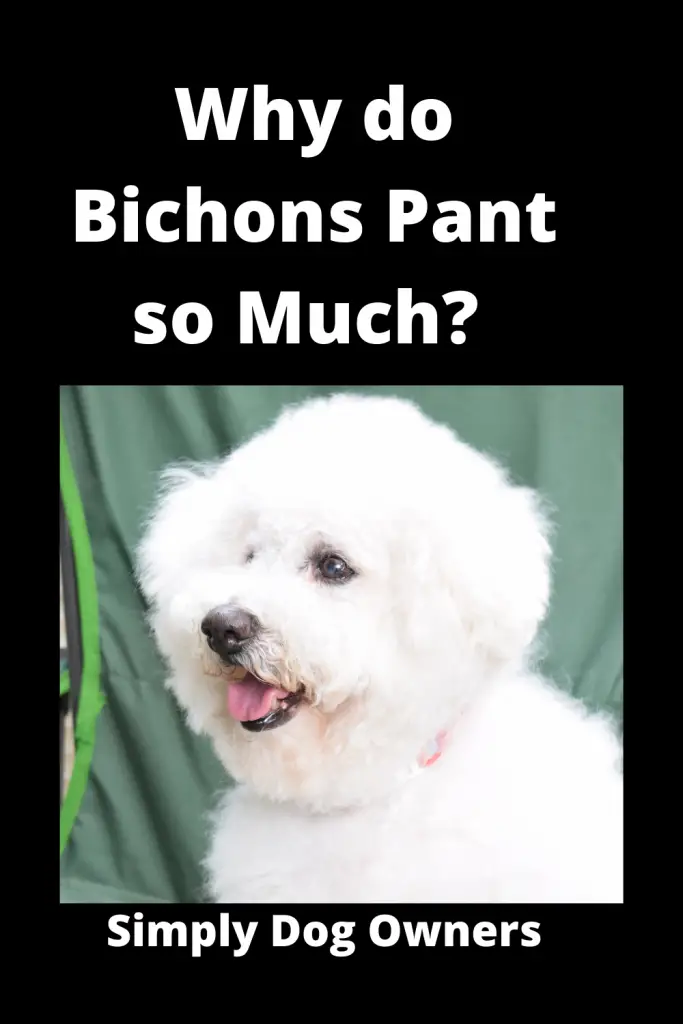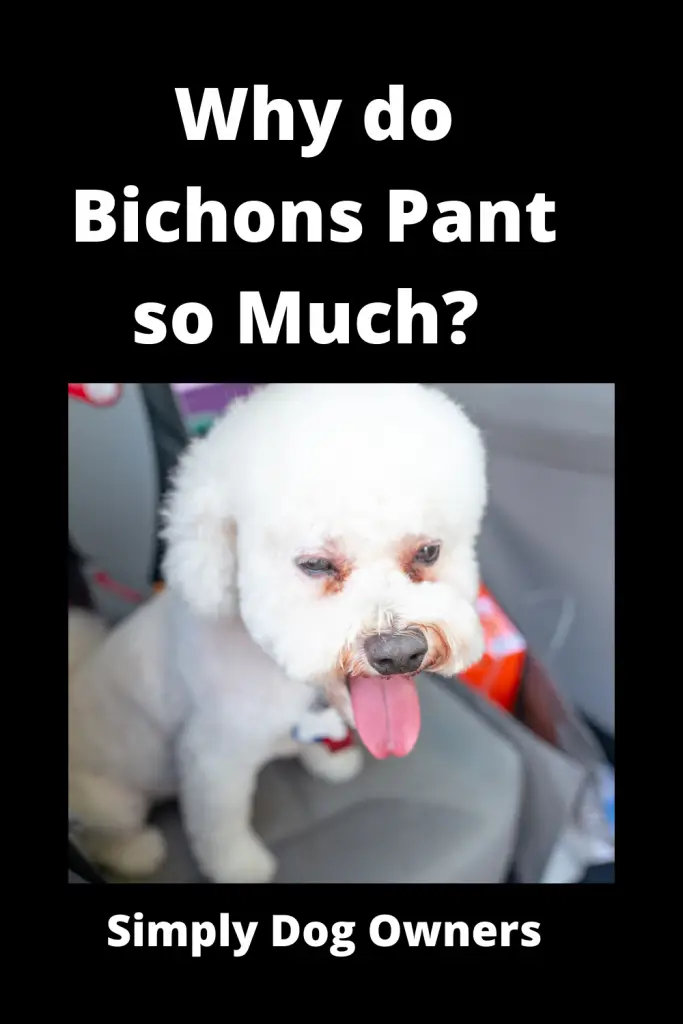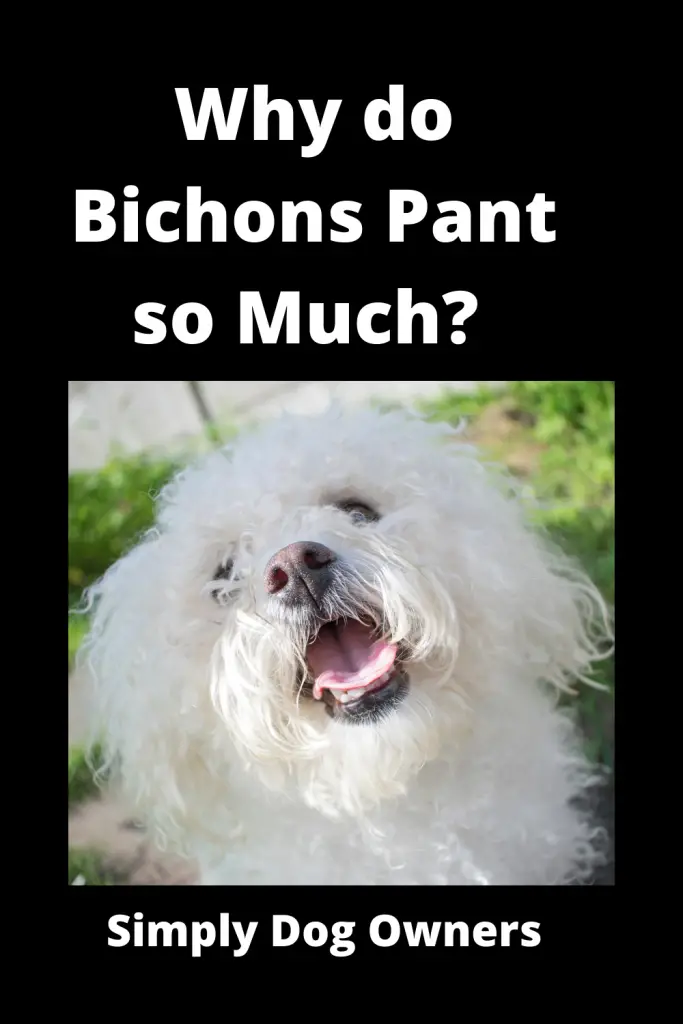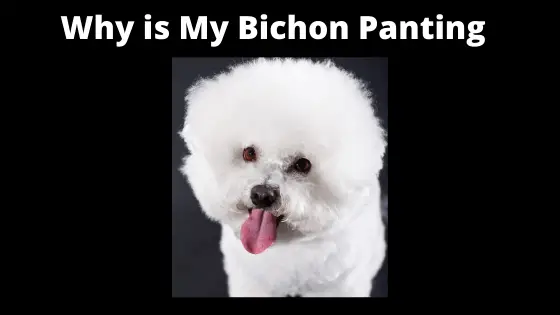Why Do Bichon Frise Pant So Much?
Have you noticed your Bichon Frise panting excessively?
There are several reasons why dogs pant. However, do keep in mind that panting in dogs is of two main types:
- Normal and natural
- Abnormal due to some underlying issues
In this blog post, we will answer the question, “Why do Bichon Frise pant so much?” in detail and also help you figure out if your dog’s panting is normal or not.
Let’s get started!

Bichons Pant so Much / Most Common Reasons
Normal panting is a dog’s natural response to his body overheating, which is why dogs pant a lot after physical activity or during an especially hot day during the summer.
Abnormal panting, on the other hand, signals to physical or emotional issues that your furbaby might be having. Following are the signs of abnormal panting in dogs:
- When compared to normal panting, abnormal panting can be labeled ‘excessive’
- It happens even when your furry friend’s body isn’t overheated and when he doesn’t need to cool his body down
- If it seems like your dog is exerting more effort than he should while panting
- If it sounds harsher and louder than normal panting
If you see anyone of these signs of overheating in your Bichon Frise, you should take him to the vet for an emergency consultation.
Here Are Some Causes of Abnormal Panting in Bichon Frises
In this section of the article, we will go through some of the most common causes of abnormal panting in Bichon Frises.

Let’s take a look.
Laryngeal Paralysis
In Laryngeal paralysis, the cartilage and muscles which close and open the larynx tend to malfunction. So, when your furry friend breathes in, the laryngeal cartilages don’t properly open, which makes it difficult for the dog to breathe.
The result? Loud, raspy panting and restricted airflow.
Cushing’s Disease
Dogs that have hyperadrenocorticism (Cushing’s disease), have hyperactive adrenal glands that produce a large amount of cortisol. The hormone, when produced in large amounts, causes a wide range of symptoms, one of which is excessive panting.
Other symptoms of Cushing’s disease include the following:
- Weight gain–even if your Bichon is on a reduced-calorie diet
- Increased thirst
- Excessive urination
- Change in skin color (from pink to gray)
- Hair loss
- Bruising
- Thinning skin
- Restlessness
- Irritability
Anemia
A dog experiences oxygen starvation due to sufficient hemoglobin and abnormally low red blood cell count which is not sufficient to carry oxygen to the body’s tissues. One of the telltale signs of oxygen deprivation is panting.
Following are some additional symptoms of anemia:
- Lethargy
- Weakness
- Elevated heart rate
- Intolerance to exercise
- Loss of appetite
- Pale mucous membranes
- Collapse
- Rapid breathing
Anxiety, Stress, Fear, and Phobias
Behavioral and psychological issues in dogs also contribute to some of the physical symptoms that you may observe.
If your Bichon Frise is easily stressed, anxious, and is sensitive to loud noises, the chances of him panting are considerably higher. Behavioral panting is also often accompanied by other signs of distress which include:
- Loss of bowel or bladder control
- Pacing
- Hiding
- Repetitive yawning
- Lip licking
- Crying or whining
- Trembling
When are Stress and Anxiety Abnormal?
It is completely normal for dogs to have a stress reaction to stressful situations and other unfamiliar events in the short-term. All this means is that your dog’s body gets the right amount of time to prepare for the fight or flight reaction.
However, if your dog remains stressed for a prolonged period of time, he will face physical and emotional discomfort that gives way to emotional and physical problems.
These, when severe enough, can also shorten your Bichon’s lifespan!

Overheating or Heatstroke
If your Bichon’s body has overheated considerably, his panting will become heavier. Signs of overheating include the following:
- Elevated body temperature
- Increased pulse
- Elevated heartbeat
- Increased body temperature
- Dark tongue and gums
- Glazed eyes
A body temperature higher than 109°F results in heatstroke.
During heatstroke, the cells of your dog’s body rapidly start to die. Swelling in the brain results in seizures. Decreased blood supply causes ulcers in the gastrointestinal tract while dehydration causes kidney damage.
All these events happen simultaneously within minutes.
Breed Predisposition
Breeds that have pushed in, short faces such as Bulldogs, Pugs, Boxers, Boston Terriers, etc. pant excessively since they suffer from long-term breathing issues. The challenge that Brachycephalic breeds face is that their upper airway is often blocked which makes it challenging for them to breathe.
These
breeds are at high risk of getting heatstroke.
Summing Up: Why Do Bichon Frise Pant So Much?
Bichon Frise is not predisposed to having breathing difficulties that may cause excessive panting. Like all dog breeds, panting can mean one of two things for Bichon Frises:
- It is a natural and normal reaction to the dog’s body overheating
- It is caused due to an underlying issue
Bichon Frises pant a lot during the summertime since it is their body’s way of cooling down during a hot day–after all, dogs don’t have sweat glands as we humans do.
However, do keep in mind that your dog may be panting excessively due to the following reasons:
- Cushing’s disease
- Anemia
- Anxiety, stress, fear, and phobias
- Overheating or Heatstroke
- Breed predisposition
If you observe any signs of abnormal panting, visit the vet as soon as possible.

